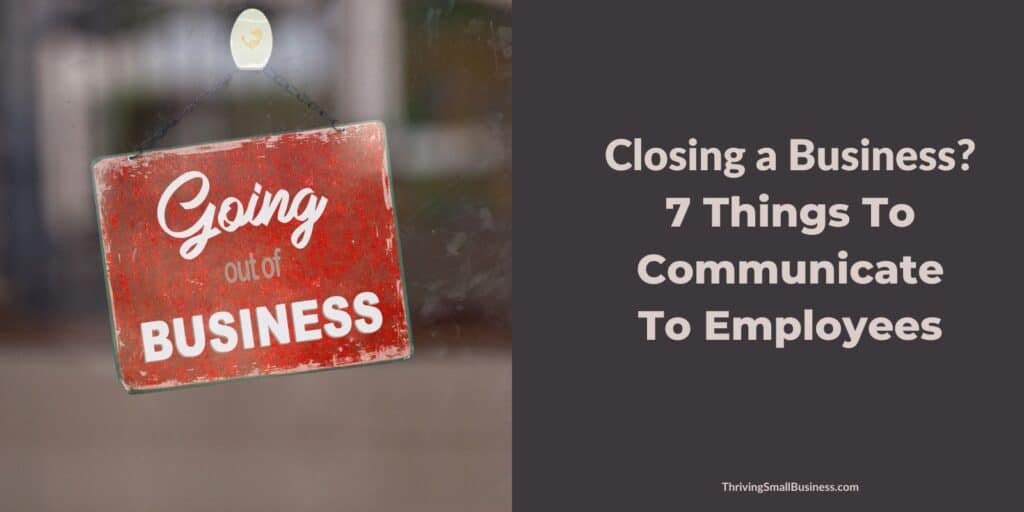Closing a Business – 7 Things to Communicate to Employees
Estimated reading time: 6 minutes
The economy has been a roller coaster for everyone, and Small Business Owners are no exception. Inflation, competition for talent, and cash flow issues all contribute to small business closures.
There is a sad statistic that 20% of new businesses fail during the first two years, 45% during the first five years, and 65% during the first ten years.
Closing a business is never an easy decision.
When a business owner makes the difficult decision to close their business, it can be tempting to announce it to the employees before thinking through those things that might be important to staff.
As difficult as it is for a business owner to come to terms with the end of an era, it can also be devastating news for employees to hear.
Take the time to think through those things that are important to employees.
Then, develop a structured communication plan to provide a smooth transition – and possibly minimize its impact on employees.
7 Things Employees Want to Know When You Close the Doors
1. Why was it decided to go out of business?
The best way to start a conversation about closing a business is to explain where the organization has been by providing a historical overview that led to the decision to close the business.
For example, “I started this business 15 years ago with a goal to do X. We had many years of success, and the journey was great. However, in the last X months, I’ve come to realize that X and we can no longer sustain the business”.
Explaining your heart behind the decision makes you more vulnerable and elicits employee empathy.
2. When will the business closing be effective?
Employees need to know when the last day for business will be and how they should plan their last few weeks or months on the job.
It is important for employees to have a clear timeline for the business closure as it helps them to mentally process the news.

Some organizations offer incentives for employees who stay until the end rather than jumping ship to the first job they can find.
For instance, offer employees a bonus of $2,000 to stay until you pack up and lock the door. This gesture will help ensure you are not the only one packing up boxes and turning off the lights.
3. What changes will there be during the transition?
Think through any operational changes that might need to take place, so employees can mentally prepare to help close the business.
For example, will cleaning out files, computer hard drives, or the warehouse be part of the business closing process?
If so, how will those tasks be handled to ensure critical data is maintained?
4. What should we tell our customers?
News of a business closing spreads like wildfire, so write a script and instruct employees what to say and what not to say to customers.
But most importantly, tell them why you feel particular information should be shared and why it is important not to share other information.
If your business relies on customer revenues until you close the door, the last thing you need is customers disappearing before you’re ready.
Prepare a formal Press Release so you can control what is communicated on news wires.
5. Will I be paid for unused benefits?
You should inventory your employee benefits and determine how they will be finalized.
For example, how will you handle unused paid time off, how will health insurance be handled, tuition reimbursement, etc?
The more information you share, the easier it will be for employees to make this difficult transition.
Try to answer their questions before they ask, and you will go a long way in securing their trust.
6. Will you help me find a job?
Let employees know if there are things you can do to help them find other work.
Offer to write letters of recommendation for your strong performers and contact other business owners in your niche to see if they have openings for your best employees.
Provide a list of similar businesses for employees to contact.
The more you can do to equip your employees to find another job, the less freaked out they will be over this transition.
7. What will happen to the facility and its contents?
Share your plan for the facility and its product and contents.
For example, will you be selling furniture and equipment? Will employees have the option to purchase anything?
What will happen to leftover products and equipment? Providing employees with equipment, furniture, or products at a deep discount can be seen as generous.
Things to think about when delivering the news.
Be Sensitive to This Life-altering Event – Remember that you will share life-altering information with employees, so be sensitive to how this may rock their world.
Create Talking Points – Take the time to write out talking points for the announcement. This will help you communicate in a logical order and will help to make sure you remember to say everything you need to say.
Rehearse What You Will Say – Practice saying the words. It is one thing to think a thought but a very different thing to speak the actual words. The more you practice, the easier, and less emotional it will be in delivering the message.
Provide Copies for Employees – Make a copy of the information shared for the employees to take home. They will likely be a little numb from the announcement and may forget some details.
Be Aware of How Quickly You Speak – Sometimes when we are nervous, we tend to speak fast to just “get it over with”.
However, you should try to communicate each point slowly and pause between communication points. This will allow the employees time to absorb what you are saying.
If you’ve ever been on the receiving end of this type of communication, you understand that sometimes the words are difficult to absorb.
Take Time to Answer Questions – Tell the employees you will take questions after presenting all the pre-scripted information. With this, you’ll have the chance to address queries even before they’re raised.
This will also tell the employees that you have already thought through their concerns and have addressed them as best as possible.
Be Prepared for Emotions – Finally, it’s important to be considerate of emotional reactions and provide ample time for those who may need a moment to collect themselves and express their feelings, possibly through tears.
Planning For Communicating with Employees Is Important
Being in the position of closing a business is never easy.
There are numerous logistical details that require thoughtful consideration, organization, and strategy.
But, taking the time to think through how this business closing will impact employees and help address issues that concern them can reduce the stress associated with this difficult transition.






